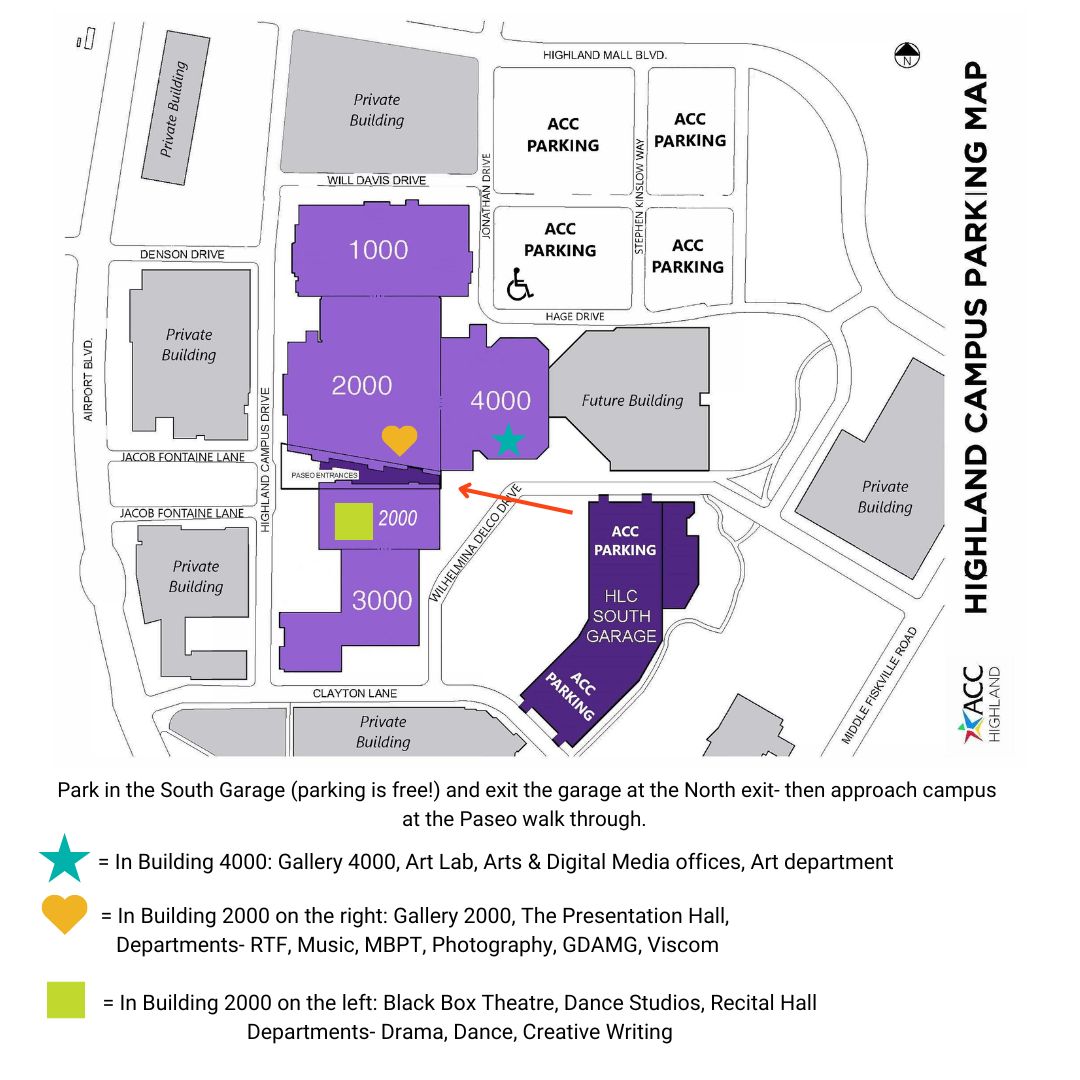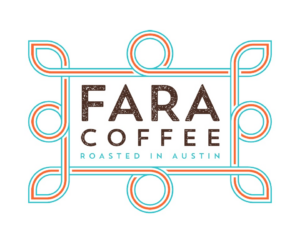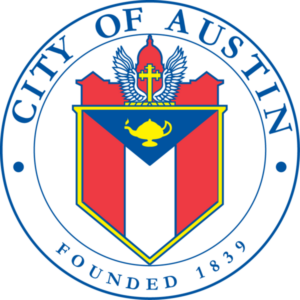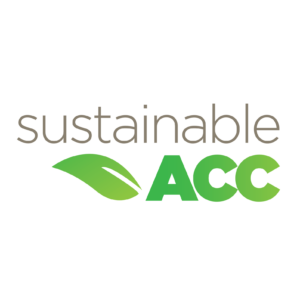
Climate Science, Climate Justice: Personal and Civic Action
Friday, April 14th from 8:15 AM to 4:30 PM
@ Austin Community College Highland Campus
Thank you to all The 9th Annual Peace & Conflict Studies Spring Symposium Participants!
Explored how current and anticipated impacts of climate change are affecting vulnerable local and global communities.
Came and discussed what climate justice looks like and how to situate themselves within an advocacy framework.
Enjoyed performances and art exhibitions by ACC students.
Welcome and Introduction

PACS Student and Faculty Volunteers.
Photography by Rene Renteria

Fara Coffee generously working to keep our participants caffeinated

Center Director, Shirin Khosropour sharing words of welcome and reflections on the intersection of climate change and peace and conflict studies
MORNING
8:15 AM-8:45 AM
Registration
Enjoy coffee and pastries while you register for the symposium
9:00-9:30 AM
Welcome
Center for Peace & Conflict Studies Director’s Welcome and Introduction followed by brief remarks from ACC Office of Sustainability
Center for Peace & Conflict Studies Director’s Welcome
Remarks from ACC Office of Sustainability
Morning panel presentation

Scene from our morning panel presentation.
Photography by Rene Renteria
9:30-11:00
Panel 1:
Climate Science, Community Transformation: The Role of Civic and Communal Action in Addressing Climate Change
In August of 2019, the City of Austin became the first southern city in the U.S. to recognize the climate change crisis as an emergency. In this panel we explore how communities both locally and globally are responding to the projected perils of climate change. The role of governments and non-governmental organizations in disaster mitigation and recovery will be examined and the role of local activists seeking to hold these entities to account will be highlighted.
Frances Acuña – has lived in Southeast Austin for 27 years and has been an active community advocate since 2010, first advocating for her son. In 2012, Frances got involved with GAVA as a community leader and is a Texas State Certified Community Health Worker. She worked with other community leaders serving as first responders during the October 2013 and 2015 floods in Dove Springs. Frances joined GAVA as a Community Organizer in 2017, where she has worked to increase access to healthy food and physical activity. Since then, her work has been focused on health and permanency, building community power for flood mitigation and the right to stay in neighborhoods where residents are most impacted by natural disasters and social disparities. Frances also volunteers her time in the Region 10 Flood Planning Group where she represents the community for the Texas Water Development Board.
Jason Cons – Associate Professor of Anthropology at the University of Texas at Austin. Dr. Cons current research is situated in the Sundarbans and the Southwest Delta region of Bangladesh. Addressing climate change-related development, conservation, industrialization, piracy, and security, it explores the ways that imaginations of future climate change are shaping the delta and the India-Bangladesh border in the present.
Celine Rendon – Former Community Engagement Specialist with the City of Austin Office of Sustainability, supporting the development of and community involvement in Austin’s 2021 Climate Equity Plan. Celine currently works as the Youth Program Manager for EcoRise.
Kevin Shunk – Floodplain Administrator for the City of Austin. Kevin is a professional civil engineer and certified floodplain manager who has more than 27 years of engineering experience. He has been at the City of Austin for 14 years where he is the Division Manager of the Watershed Engineering Division, which is responsible for the City’s flood risk reduction projects, floodplain management program, and the City’s flood early warning system.
Moderated by ACC’s Dr. Carleen Sanchez
Arts and Understanding

Toni Hammler performing her original piece, Too Late. Photography by Rene Renteria

Faculty member, Melissa Sanderson, introducing student performers from her Dance Composition – Choreography course

Elisabeth Placencio performing her original piece Restricted

Hilleary Warren performing her original piece Running From Drought

Faculty member, Heather Barfield, introducing her students and sharing information about the works being performed from playwright Chantal Bilodeau

Khalia Sacko and Jade Faulkner performing a scene from Chantal Bilodeau’s play Sila

Jade Faulkner reciting Mother by Chantal Bilodeau.
11:15-12:30
Art & Understanding:
Dramatic, Visual, Movement, Film, and Music Pieces exploring humanistic relationships to climate change and action
Featuring Performances by ACC’s Dance and Drama Students
Guided tours to the Student Art Exhibit in the Art Lab
Exhibition title: Climate Science, Climate Justice: Personal and Civic Action

Symposium attendees learning about the student art exhibit in the Art Lab. Photography by Rene Renteria

Arts and Digital Media Program Coordinator Nicole DiMucci announced the student art competition winners.

Exhibition title: Climate Science, Climate Justice: Personal and Civic Action
Semester: Spring 2023
Exhibition Dates: Friday, April 14, 2023 through Friday, May 5, 2023
Gallery: Art Lab
View All The ARTWORK HERE
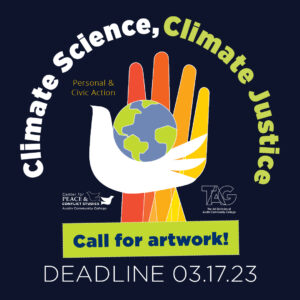
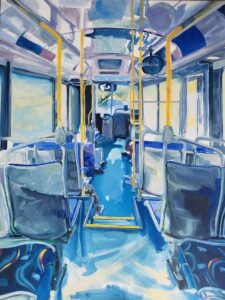

SECOND PLACE Kristine Corona “I Love New York ”
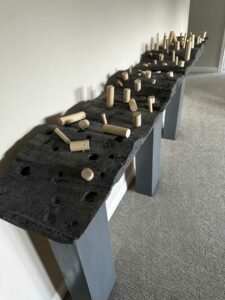
THIRD PLACE Everardo Camacho Wanless “Requiem to the Forest”
Community experts and organizers sharing activism locally and globally

Zero Waste Stations and volunteers provided by the Office of Energy and Sustainability.
Photography by Rene Renteria

Citizen’s Climate Lobby helping folks get engaged in climate activism and advocacy

Olya Sukhopar sharing information about about the Plastic Reduction Project
AFTERNOON
12:30-1 PM
Lunch
Enjoy a vegetarian lunch while you visit Community Organizations working on climate science and climate justice.
Peace Educator Award

Deborah Pool accepts the Peace Educator Award from Center Director Shirin Khosorpour.
Photography by Rene Renteria
1:00-1:15 PM
Peace Educator Award
The Peace & Conflict Studies Center annually recognizes a leader in peace education in the community. This year, we are excited to present Deborah Pool with the Peace Educator Award in recognition of her outreach, counseling, and advocacy work with current and previously incarcerated people. For over 16 years, Deborah Pool has visited with inmates nearing the end of their sentences to establish relationships while sharing information, resources, and support available through ACC to formerly incarcerated people. Demonstrating both her commitment to the students and her deep understanding of the difficulties formerly incarcerated students can face, she also serves as Faculty Advisor to Students With a Purpose (SWAP), a registered student organization that works to provide educational resources and create a supportive environment to empower students in their personal, academic, and professional lives.
Keynote

Dr. Benjamin Kirtman delivering his keynote address, “Understanding Climate Change Science from Days-to-Decades, Global Societal Implications and Need for Local Community Values to Inform Adaptation Science.”
Photography by Rene Renteria
1:15-2:30 PM
Keynote:
“Understanding Climate Change Science from Days-to-Decades, Global Societal Implications and How Local Community Values Inform Adaptation Science”
This presentation will summarize the physical basis for climate change science highlighting the scientific understanding of how extremes in drought, floods, heat waves, cold spells, coastal inundation, fires and hurricanes are predicted and projected to change over the next few decades out to the end of the century. The presentation will also discuss how the change in extremes is projected to lead to increasing challenges in worldwide food and water security, migration and potential loss of cultural identity and how this drives global mitigation strategies. Finally, the importance of including local community values in the development of the physical science underpinning adaptation and resilience planning is described.
Keynote
Understanding Climate Change Science from Days-to-Decades, Global Societal Implications and How Local Community Values Inform Adaptation Science
Benjamin Kirtman – Professor Benjamin Kirtman received his BS in Applied Mathematics from the University of California-San Diego in 1987, and his MS and Ph.D. in 1992 from the University of Maryland-College Park. Dr. Kirtman is a full professor of Atmospheric Sciences, is the Director of the Cooperative Institute for Marine and Atmospheric Studies (CIMAS) and serves as the Deputy Director for the Institute for Data Science and Computing at the University of Miami Rosenstiel School of Marine, Atmospheric, and Earth Sciences. Internationally, Dr. Kirtman has enjoyed a leadership role in the World Climate Research Program (WCRP) seasonal to-interannual prediction activities. In particular, he has chaired the International Clivar Working Group on Seasonal to Interannual Prediction (WGSIP), and the WCRP Task Force for Seasonal Prediction (TFSP). Dr. Kirtman was a coordinating lead author for the Intergovernmental Panel on Climate Change (IPCC) working group one – the Scientific Basis.
Panel 2

Faculty member, Amber Sarker, posing a question to panelists.
Photography by Rene Renteria

Dr. Adelita Cantu, Faculty of Nursing at UT San Antonio, presenting during our afternoon panel

Attendees taking notes throughout the presentations
2:45-4:15 PM
Panel 2:
Building Community Immunity: Climate Adaptation in the Public Health Profession
As the repercussions of the climate crisis become more apparent in Texas, our public health community is increasingly responding. In this panel, we explore the impacts of climate change on the health of Texan cities, citizens, and communities with representatives from the Red Cross, the City of Austin, and public health experts.
Adelita G. Cantu – Associate Professor at UT Health San Antonio School of Nursing. She has over 35 years of public and population health nursing with a focus on primary and secondary health promotion and prevention of chronic diseases among undeserved, vulnerable populations. Dr. Cantu is a member of the Alliance of Nurses for Healthy Environments and a mentor in their Fellowship Program. Recently, Dr. Cantu worked with the city of San Antonio in the development of their Climate Action and Adaptation Plan to ensure that equity would play a major role in the implementation of the plan.
Ivan Castro-Arellano – Associate Professor of Biology at Texas State University. He uses his background and training as an ecologist to address questions to understand the ecology of zoonotic diseases and invasive species. Since mammals are natural reservoirs for many zoonotic diseases most of his work has been devoted to this taxonomic group, especially rodents and bats.
Marc Coudert – Environmental Conservation Program Manager with the City of Austin Office of Sustainability. As an employee of the City of Austin Office of Sustainability, Marc works with city departments to embed climate change resiliency into long term operation and asset management planning. In this role, he also supports community organizers to increase climate resilience in East Austin.
Mary McCarthy – Licensed clinical psychologist (PhD) in private practice serving children, adolescents, and their families. In addition to her full time private practice, Mary serves as a volunteer with the American Red Cross’ Disaster Mental Health Team serving Central and South Texas.
Moderated by ACC’s Dr. Mark Shepherd
Throughout the day, participants can explore a curated art exhibition and booths by community organizations.
Explore local and global impacts of climate change from perspectives of atmospheric and earth sciences, public health, postcolonialism, anthropology, equity, engineering, and civil administration.
Art & Understanding: Dramatic, Visual, Movement, and Music Pieces exploring humanistic relationships to climate change and action will be featured.
Community experts and organizers will share experiences in navigating & theorizing around borders, disaster, citizenship, and activism locally and globally.
Visit Austin-Area organizations working on climate justice to find opportunities for engagement.
The 2023 Symposium will be held at the ACC Highland Presentation Hall located on the first floor of the campus.
HLC Building 2000, Presentation Hall
Jonathan Dr, Austin, TX 78752
More info on parking and transportation can be found here
